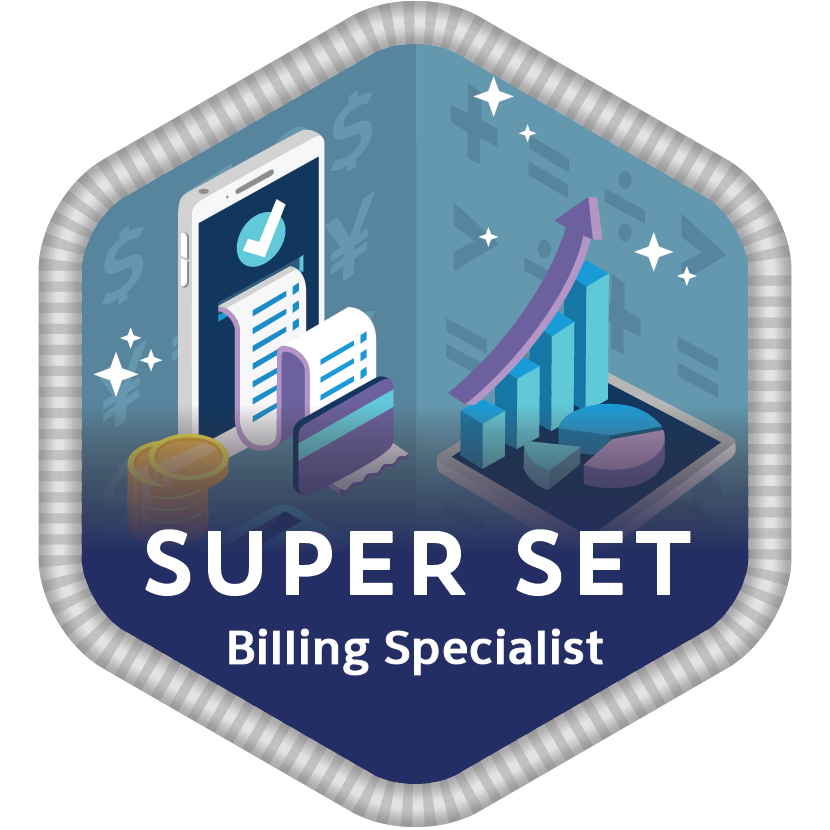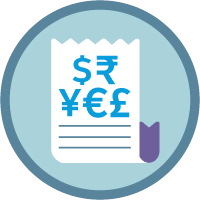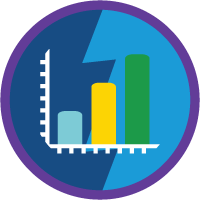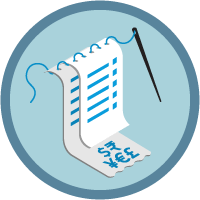Advanced Billing Specialist
Showcase your skills working with advanced billing processes, invoice generation, and CPQ.
Advanced Billing Specialist
What You'll Be Doing to Earn This Superbadge
- Sign up for a developer org with Revenue Cloud
- UMS US Legal Entity creation and order product automation
- Finance Book and Finance Period creation for UMS US (accounting and revenue)
- Enhance Salesforce Billing transactions with general ledger information
- Configure Billing Rule and Billing Treatment to control invoice behavior
- Configure full and pro-rata revenue recognition for Major Solar Panel one time and subscription products
- Review account balance information using the Account Balance Snapshots and a custom billing report
- Create an automation process to alert customers of past due invoice balances
- Upsell Cloud Kicks through a contract amendment
- Knowledge Check (Quiz)
Concepts Tested in This Superbadge
- Utilize the Salesforce Billing Configuration App to support downstream recordkeeping
- Set up revenue recognition to support full and pro-rata product requirements
- Automate Legal Entity population using a Flow automation
- Process order amendments and cancellations for recurring customers
- Generate Account Balances Snapshots and create a custom billing report
- Correct and adjust invoices per best practices
- Perform contract amendment for Cloud Kicks
- Knowledge Check (Quiz)
Pre-work and Notes
Sign up for a Developer Edition org with Salesforce Billing and Salesforce CPQ.
To complete this superbadge, you need a special Developer Edition org that contains Salesforce CPQ, Salesforce Billing, and our sample data. Get the free Developer Edition and connect it to Trailhead now so you can complete the challenges in this superbadge.
Even if you've recently signed up for a special Billing-enabled Developer Edition org, sign up for a new one now. We're always adding new data. Also note that the managed packages expire after 90 days, so you may need a new org anyway. Make sure you are not using an org previously used for other Trailhead work, including other superbadges.
- Sign up for a free Developer Edition org with Salesforce Billing and Salesforce CPQ.
- Fill out the form. For Email, enter an active email address.
- After you fill out the form, click Sign me up.
- When you receive the activation email (this might take a few minutes), open it and click Verify Account.
- Complete your registration by hsetting your password and challenge question. Tip: Save your username, password, and login URL in a secure place—such as a password manager—for easy access later.
- You are logged in to your Developer Edition.
- Now, connect your new Developer Edition org to Trailhead.
- Make sure you're logged in to your Trailhead account.
- In the Challenge section at the bottom of this page, select Connect Org from the picklist.
- On the login screen, enter the username and password for the Developer Edition you just set up.
- On the Allow Access? screen, click Allow.
- On the Want to connect this org for hands-on challenges? screen, click Yes! Save it. You are redirected back to the challenge page and ready to use your new Developer Edition to earn this superbadge.
- Now that you have a Salesforce org with these managed packages installed and enabled, you’re good to go.
Grab a pen and pencil. You may (absolutely should) want to jot down notes as you read the requirements.
- Use the naming conventions specified in the requirements document to ensure a successful deployment.
- Default currency is USD and default time zone is PST (necessary for dates and schedulers).
- Some of the terminology used in this superbadge is descriptive and may not match the name as it appears in the UI. This is to test your knowledge of Salesforce features and using the correct one to satisfy a business need.
- The Advanced Billing Specialist Superbadge is a continuation of the Billing Specialist Superbadge and is intended to build on the same use case, but each are independent of one another. Although both include similar storylines, you will need to have separate dev orgs provided by each challenge to pass the Superbadge.
- An opportunity and quote (Q-00007) have been created ahead of time for the final challenge. Do NOT use these records prior to the final challenge, or you will likely cause challenge failures.
- Tip: Copy and paste values when they are provided for metadata and record data. This will reduce the chances of typos and misspellings that cause challenge failures.
Use Case
Ursa Major Solar, Inc. (UMS) implemented Salesforce Billing over a year ago and is experiencing many benefits from implementing this solution. Solange, James, and the rest of the Billing team have reduced the amount of manual work required to maintain their billing system. The team is so happy that they want to implement some of the features they are not yet using.
They have reached out to you, as the consultant who helped implement the original solution, to ask that you help with the second phase of the implementation. You are responsible for configuring the system to meet the additional business requirements provided by UMS stakeholders and to update Cloud Kicks’s annual contract. By the end of the second phase, UMS will be able to provide more enriched data for recordkeeping, reporting for a clear view on outstanding customer balances, and present and deliver invoice documents to customers.
Key Stakeholders
- Weimar Williams (CFO)
- Lincoln Ulrich (account executive)
- Solange Pereira (billing operations specialist)
- James August (controller)
- Maria Jimenez (system administrator)
Standard Objects
- Product
- Account
- Opportunity
- Order
- Order Product
- Contract
Custom Managed Package Objects—Transactions
- Quote
- Quote Line
- Subscription
- Invoice
- Invoice Line
- Credit Note
- Credit Note Line
- Credit Note Line Allocation
- Revenue Schedule
- Revenue Transaction
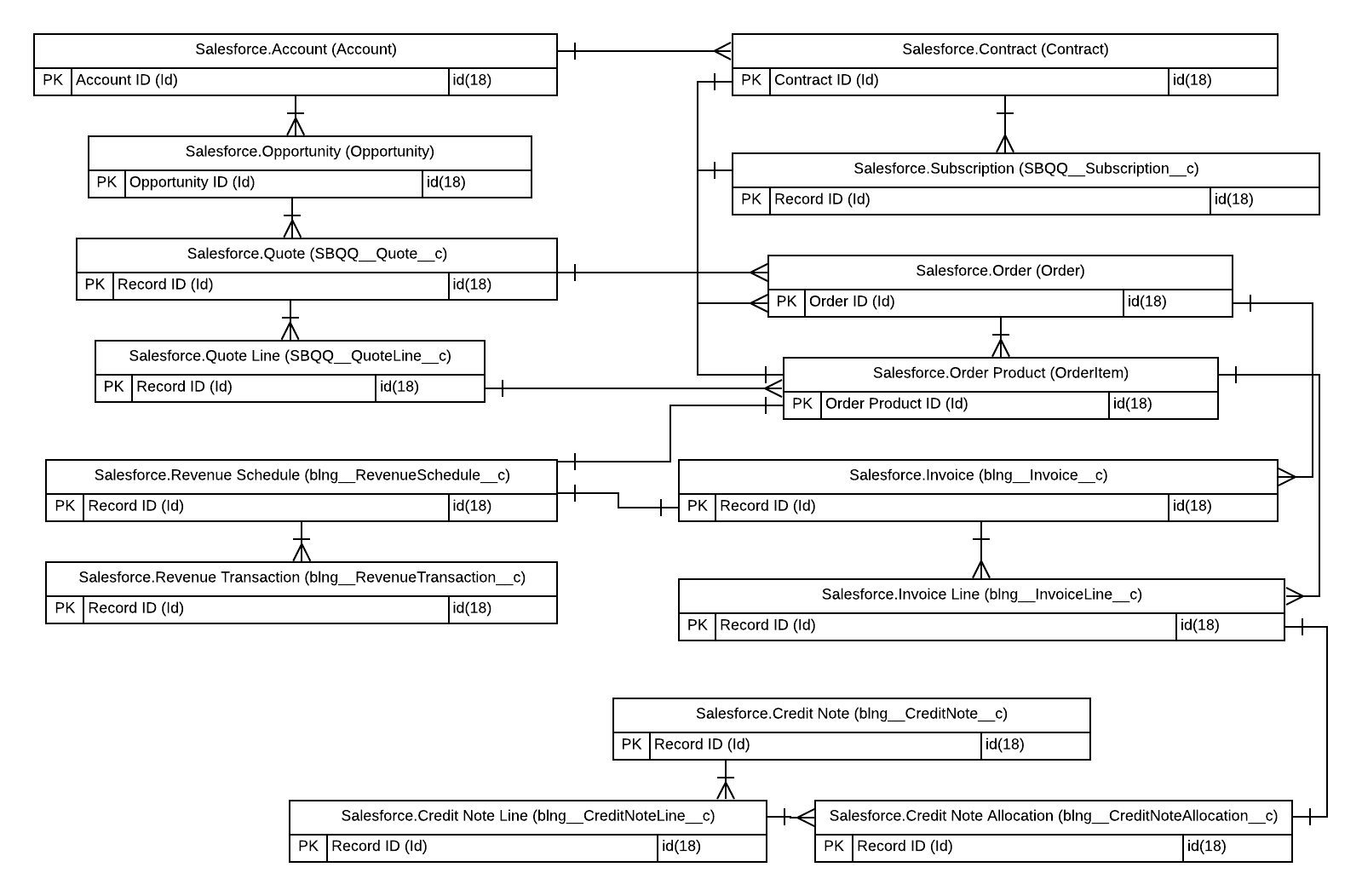
Custom Managed Package Objects—Configurations
- Legal Entity
- Finance Book
- Finance Period
- GL Account
- GL Rule
- GL Treatment
- Billing Rule
- Billing Treatment
- Revenue Recognition Rule
- Revenue Recognition Treatment
- Revenue Recognition Distribution Method
- Aging Buckets
- Account Balance Snapshot
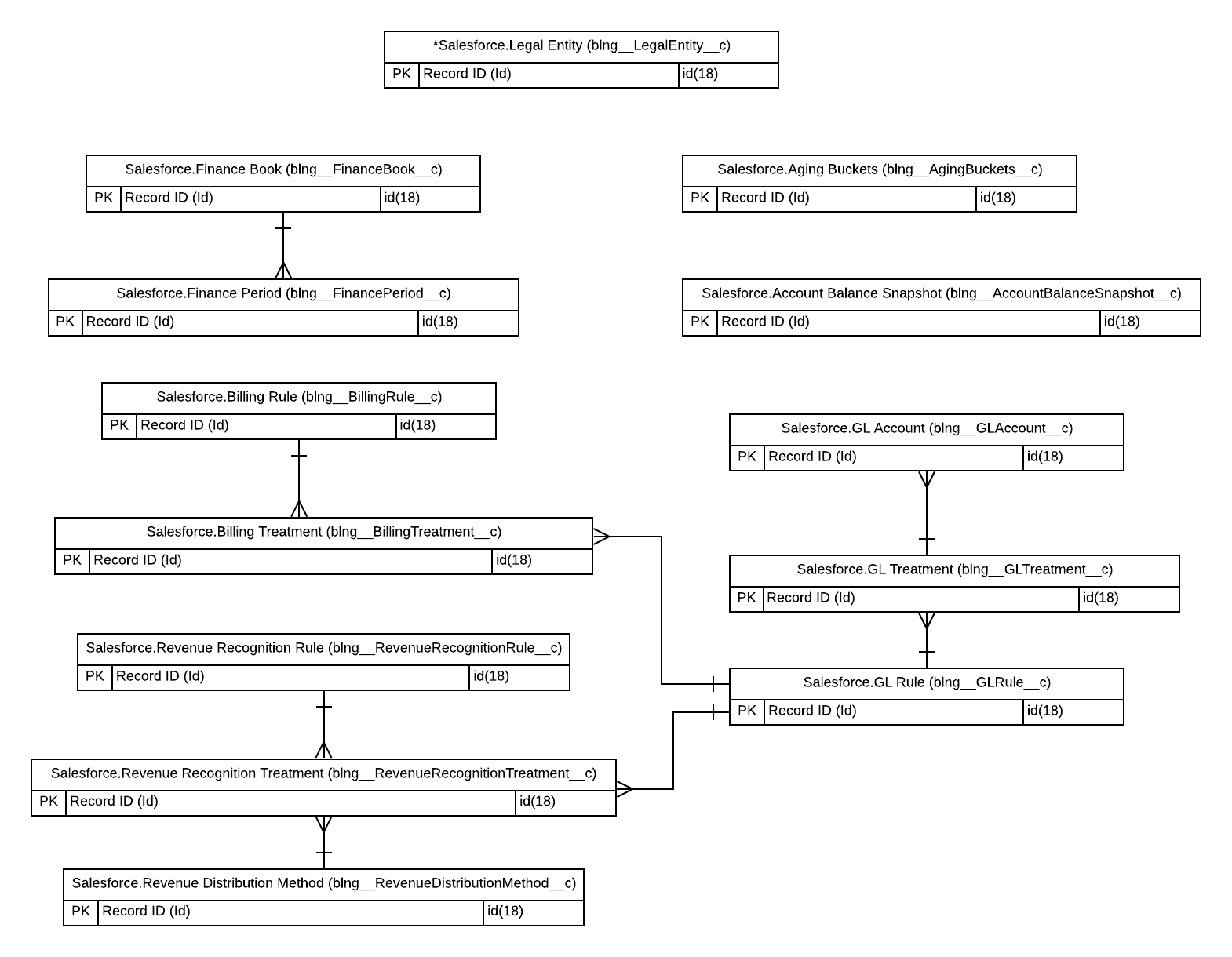
Custom Objects
None required for this Superbadge (only custom objects from managed package).
Business Requirements
Legal Entity Configuration for UMS US-Based Business
UMS is growing and expanding its business, and needs the ability to begin associating billing transactions with the UMS US legal entity.
Maria would like to ensure that the legal entity is automatically populated on the order product and associated to records that will be integrated to the ERP. This information will help improve recordkeeping in UMS’s ERP system and will begin laying the foundation for UMS to expand to other countries. Use the existing Flow named Order Product Automation to complete this challenge. You will need to create a new Update Records element and use the Default Outcome from the existing Order Product Decision element.
| Legal Entity Name |
|---|
| UMS US Legal Entity |
| Custom Setting Object Name | LegalEntity |
|---|---|
| Custom Setting Label | LegalEntity |
| Visibility | Public |
| Custom Field Data Type | Text |
| Length | 50 |
| Custom Field Label | LegalEntityID |
| Custom Field Name | LegalEntityID |
| Flow | Order Product Automation |
|---|---|
| Update Records element Label | Populate Legal Entity on Order Product |
| Field to Update | Legal Entity |
| Value | Element Reference to LegalEntityID__c as $Setup.LegalEntity__c.LegalEntityID__c |
Finance Book and Finance Period Creation for Accounting and Revenue Transactions
UMS requires two finance books and 3 years (36 months) of finance periods to track both accounting and revenue-type transactions created by Salesforce Billing. Weimar would like to utilize Finance Book and Finance Period functionality to meet this requirement and support financial reporting processes.
After talking with you, Weimar is pleased to learn that Salesforce Billing will automatically sort accounting and revenue transactions with some basic setup. Now that a US legal entity has been created, he would like you to also configure Salesforce to automatically associate the correct finance period to a transaction based on the transaction date and legal entity.
| Accounting Finance Book Name | UMS US Accounting Finance Book |
|---|---|
| Revenue Finance Book Name | UMS US Revenue Finance Book |
General Ledger Configuration for Enhanced Recordkeeping
UMS requires general ledger account information to be passed from transactions generated by Salesforce Billing to their ERP system to assist in double-entry bookkeeping. They need to know which GL account to credit and debit when an invoice line is posted and revenue transaction is created. Weimar and Solange have provided you their general ledger account information and how those accounts should be impacted based on their business requirements. Please feel free to set the GL Treatment Name field to anything meaningful, but we are not checking it.
| GL Account Name | GL Account Number |
|---|---|
| Earned Revenue | 1201 |
| Deferred Revenue | 2001 |
| AR | 3000 |
| GL Rule Name | Credit GL Account | Debit GL Account |
|---|---|---|
| Post Invoice | Deferred Revenue | AR |
| Recognize Revenue | Earned Revenue | Deferred Revenue |
Configure Billing Rule and Billing Treatment to Control Invoice Behavior
UMS requires all products in their product catalog to have the ability to generate invoice lines. If a product has a partial charge period, then UMS requires the charge to be on a separate invoice line.
Lastly, UMS requires all invoice lines generated by Salesforce Billing to be automatically associated to the correct general ledger and legal entity configurations for recordkeeping purposes. You can set the Billing Treatment Name field to anything meaningful, but we are not checking it.
| Billing Rule Name |
|---|
| Generate Invoice Billing Rule |
Configure One-Time and Subscription Products for Full and Pro Rata Revenue Recognition Reporting
Weimar, Solange, and James have decided that UMS will begin using Salesforce Billing revenue recognition functionality to support downstream revenue reporting. UMS’s ERP system will require Revenue Schedule and Transaction record information from Salesforce for all products in its product catalog.
Subscription products should generate revenue schedules upon order activation with 50% recognized in full on the order product start date, and the remaining 50% as a monthly distribution method.
One-time products should also generate revenue schedules upon order activation, but have 100% recognized in full on the order product start date.
Similar to invoice lines, UMS requires all revenue schedules generated by Salesforce Billing to be automatically associated to the correct general ledger and legal entity configurations for recordkeeping purposes. You can set the Revenue Recognition Treatment Name field to anything meaningful, but we are not checking it.
Tip: Configure the Revenue Recognition Treatments’ Processing Order to use the values '1' and '2' respectively to represent the order in which the Treatments should be applied to meet business requirements. To learn more, please review the article: Advanced Billing Specialist: Trailhead Challenge Help.
| Revenue Recognition Rule Name | Full Revenue Recognition Rule | 50/50 Full and Pro Rata Revenue Recognition Rule |
|---|
| Revenue Distribution Method Name | Full Distribution Method | Pro Rata Distribution Method |
|---|
| Product Code | Product Revenue Requirement |
|---|---|
| PANEL-BUY | Full |
| PANEL-RENT | 50/50 Full and Pro Rata |
| WARRANTY-MAINT | 50/50 Full and Pro Rata |
Monitor Customer Account Balances Through Account Balance Snapshots and Custom Reports
UMS currently has no process in place to monitor accounts with outstanding invoice balances, unallocated payments, and unallocated credit and debit notes. Solange has requested that her team be given visibility to track the number of days that an invoice is past due, and would also like for her team to be able to access a daily snapshot of this information for the Cloud Kicks account. The snapshot should separate outstanding balances into buckets based on the following past due number of days.
- 1–30 Days
- 31–60 Days
- 61–90 Days
- 91–120 Days
- 121+ Days
| Balance Snapshot Scheduler Name | Cloud Kicks Balance Scheduler |
|---|
In addition to this request, Solange would like some updates to be made to the custom AR Aging Report that was recently created by UMS. Currently, the report displays payments and balances. Solange would like for the payments and balances to be summarized for each account, so that users can easily see the total outstanding amounts for an individual account without doing any calculations outside of Salesforce. The report should include all Invoices that have been generated by UMS, so you will want to make sure that the Date Field on the Report is set to "Invoice Date" and that the Range is set to "All Time." This will allow the team to access all of the data they need.
Solange also thinks that users would benefit from seeing the outstanding amounts grouped into the past due number of days. She would like to use the same grouping buckets that were used in the Balance Snapshot. This will be useful for users and make it easier to identify invoices based on their due date, as invoices with due dates between 1–30 days in the past will be grouped together, the same will occur for invoices between 31–60 days past due, and so on and so forth.
| Source Column | Days Outstanding (Positive) |
|---|---|
| Bucket Field Name | AR Aging Grouping |
Create Automation to Alert Account Owners of Past Due Balances
UMS currently does not have a dunning process in place. The company would like to change this by having the account executive team reach out to their accounts when they have invoices that are more than 30 days past due. Lincoln mentioned that it’s difficult for account executives to consistently monitor their accounts for past due balances. The account executives typically don't interact with Salesforce reports, but they do check their email on a daily basis. He's asked that account executives receive a one-time email notification when they have accounts with invoices that exceed 30 days past due. This would allow account owners to be immediately notified of past due balances and reach out to their customers to collect these past due payments.
Create a Flow to send an email when an invoice is 30 days past due. Use the existing email action called Send Email Notification of Past Due Invoice. The scheduled path should execute the send email action element.
| Flow Name | Invoice Automation |
|---|---|
| Configure Trigger | A record is updated |
| Entry Conditions | Balance greater than $0 |
| Scheduled Path label | Send Email Alert for 30 Days Past Due Invoices |
| New Action label | Send Email Notification of Past Due Invoice |
Upsell Cloud Kicks Through Contract Amendment
UMS customer Cloud Kicks is happy with the products it purchased from UMS 6 months ago. So happy that Cloud Kicks has called Lincoln and would like to rent an additional two solar panels for a total of 12 panels.
Cloud Kicks also informed Lincoln that Bright Sneakers, a subsidiary company, should receive the invoice, but Cloud Kicks will still own the order and contract. Cloud Kicks would like this change to be made immediately and represented on a single invoice this month and every month moving forward.
| Amendment Order Start Date | Original Quote Start Date + 7 months |
|---|---|
| Order Billing Account | Bright Sneakers |
| Order Invoice Batch | Cloud Kicks Batch |
You have been asked to support Lincoln as he completes Cloud Kicks’s request and utilizes some of the new functionality you recently implemented. First you must cancel invoice INV-0042 and unallocate the existing payment for the charges that were already sent to the subsidiary company, Bright Sneakers.
Once you've completed the invoice cancellation you must amend Cloud Kicks’s current contract related to their account, add the additional two solar panels, and generate the amendment order. Upon completion, update the Override Next Billing Date field on the order product for the additional solar products to align with the contract's original order product's Next Billing Date. Make sure all the other components of the orders and order products are staged correctly to invoice together and be sent to Bright Sneakers per Cloud Kicks’s request.
At the end of this challenge, Bright Sneakers is expecting a single invoice record with at a minimum two invoice lines: an invoice line to represent Major Solar Panel Rentals with a total quantity of ten, plus an additional invoice line to represent Major Solar Panel Rentals with a total quantity of two.


